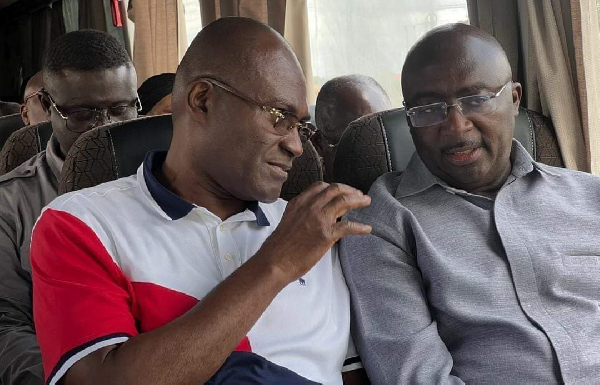The internal strife within Ghana’s New Patriotic Party (NPP) has intensified as Kennedy Agyapong’s campaign team accuses the party’s national executives of blatant bias towards Vice President Mahamudu Bawumia in the run-up to the presidential primaries. Agyapong’s spokesperson, Kwasi Kwarteng, condemned the party’s decision to exclusively livestream Bawumia’s nomination filing on official NPP social media platforms, labeling it a betrayal of the unity the leadership claims to champion. This action, according to Kwarteng, is not an isolated incident but part of a larger pattern of favoritism aimed at providing Bawumia an unfair advantage, echoing similar tactics employed in previous primaries. The statement argues that these actions undermine the democratic process within the party and sow discord among members.
The accusations levied by Agyapong’s camp extend beyond mere procedural irregularities to encompass Bawumia’s performance as Vice President and his potential impact on the party’s future electoral prospects. Kwarteng directly links the NPP’s recent electoral decline to Bawumia’s leadership, citing significant drops in national, northern, southern, and Zongo community votes as evidence of his perceived electoral weakness. He argues that while the party should be focused on rebuilding its base and addressing the concerns that led to these losses, the leadership is instead prioritizing Bawumia’s candidacy, potentially at the expense of the party’s overall well-being. This, according to Kwarteng, is a dangerous gamble that could further alienate voters and jeopardize the NPP’s chances in the upcoming elections.
The core of the dispute centers on the perceived manipulation of party machinery and resources to bolster Bawumia’s candidacy. Kwarteng accuses the NPP leadership of shamelessly promoting Bawumia as the “establishment choice” by granting him preferential treatment and access to party platforms. This favoritism, he argues, creates an uneven playing field for other aspirants and undermines the principles of fairness and transparency that should govern internal party elections. The implications, according to Agyapong’s camp, are significant, potentially leading to a fractured party and diminishing the NPP’s ability to present a united front in the 2028 general elections.
The strong wording employed by Kwarteng underscores the seriousness of the allegations and the growing rift within the NPP. He warns that if these practices persist, other candidates might be forced to consider alternative paths, suggesting a potential breakaway faction within the party. The statement’s concluding assertion that “the grassroots would not be forced into silence while the future of the party is mortgaged for one individual” points to a potential groundswell of discontent among party members who feel their voices are being ignored in favor of a predetermined outcome. This warning signals the potential for further escalation of the conflict and the possibility of long-lasting damage to party unity.
The timing of these accusations, just as the NPP gears up to select its presidential candidate for the 2028 elections, adds further weight to the situation. With Bawumia and Agyapong considered frontrunners, the perception of unfair advantage could significantly influence the outcome of the primaries and potentially even the general election. The public airing of these grievances highlights the internal power struggles within the NPP and the differing visions for the party’s future. The outcome of this dispute will likely shape not only the NPP’s leadership but also its broader political strategy in the coming years.
The allegations of bias and favoritism leveled against the NPP leadership represent a critical juncture for the party. If not addressed effectively, these internal divisions could undermine the party’s ability to compete effectively in the 2028 elections. The challenge for the NPP leadership is to navigate this internal conflict while maintaining party unity and ensuring a fair and transparent process for selecting its presidential candidate. The stakes are high, and the future of the NPP may depend on how it handles this delicate situation.














